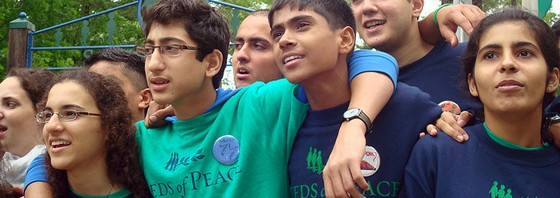The mission of Seeds Of Peace summer camp is simply summarized as, “Treaties are made by governments; peace is made by people”. The camp seeks to open the paths for communication, and eventual understanding, between the sides of conflicted regions. On an unassuming Sunday morning in July, a handful of Boston Demons and Lady Demons hit the road up to Maine for what can only be described as a once in a lifetime kind of day.
A few weeks earlier, a young Israeli by the name of Yonatan Belik […] wrote the USAFL asking if there’s a footy team somewhere near Maine. Yonatan, it turns out, is a two-time member of the infamous Peace Team, a combined team of players from the conflicted nations of Palestine and Israel. In both 2008 and 2011’s International Cup, Yonatan and his Peace Team teammates proved to the world that sports can cross boundaries, military checkpoints, racial tensions and outright war. It seemed almost fitting that Yonatan and former Palestinian teammate Leith Jaber would be co-counselors at this incredible summer camp in Maine this summer. It seemed even more fitting that Australian Rules Football should be the sport that these trailblazers for peace and acceptance should bring to camp. It didn’t take Demons president Joe Connor very long to jump on the opportunity to bring some Demons up there for a day of footy, fun and education.
We arrived at the camp on a picturesque lake in rural Maine around 10 AM. Yonatan, known as Koda at camp, greeted an eager group of Demons and we set out to prepare for a full day’s activities. On the walk from the parking lot to the field, Koda explained that the little huts we were passing by were known as Dialogue Alley. In these huts, campers from different nationalities, or both sides so to speak, are put together to start the dialogue of peace and acceptance. One of the Demons remarked that it’s probably quite tense in those huts during the first few weeks of camp, as campers are literally faced with “the enemy”, often for the first time. As we walked through here, it started to settle in what we were really doing there that day, and the reality of what we were playing a role in, if even for a day.
We were here to conduct footy clinics with the campers of many different nationalities, including Israelis, Palestinians, Indians, Pakistanis, Jordanians and Egyptians with a handful of Americans thrown in for good measure. These campers are known as “seeds”, because they literally become the seeds for greater understanding in their respective worlds. Seeds of Peace works with regional governments to select seeds from a huge applicant pool for the 3 week summer conflict resolution program. In addition to their dialogue and conflict resolution programs, the seeds are exposed to arts and crafts, music and other creative programs, and yes, sports. On our walk to the field we passed a group of seeds learning probably the most popped-collar, preppy sport America has to offer, lacrosse, and they weren’t half bad.
However, we were here for footy. And what a day of footy it turned out to be. The Demons worked with about 70 seeds in our three dedicated footy clinics. Some of these seeds had chosen footy as their special activity after being introduced to the game by Koda in the first week of camp. Others had never even seen a footy, let alone had a kick or the inclination to pick up a ball. We started out showing the seeds how to perform a handpass, and yes, this Demon can honestly say the refresher crash course she received that morning has served her well in subsequent trainings. But I digress.After handpassing fundamentals we moved on to some kicking lane work, and with footies flying everywhere, the seeds were off to a great start. To really get the competitive juices flowing, we moved right into a bounce relay. Now, if you’ve ever tried to bounce an oblong ball, on a hard surface, while running at a full sprint, you know that this is not for the faint of heart. The seeds put up an admirable effort though and we had a blast. We wrapped up each hour long clinic with a bona fide touch footy game and sent the seeds to their next activity dusty, sweaty, but smiling from ear to ear.
The bounce races were very competitive, and fun!
Between sessions we were shown every hospitality, served a delicious lunch with the counselors and co-founder of the camp, and even given a tour including a stop in Koda’s group’s bunk where we signed autographs, took pictures with the seeds and even got to leave a little reminder that we were there. Throughout this entire time, we were taught more and more about the process, the mission, the seeds and their potential impact on the future. You know how beauty queens always answer that their number one wish is world peace? Well, these counselors and campers were living the solution to that wish every day, and for one day, we got to live it too.
Our day wrapped up with a half hour of full on touch footy with the group of seeds who selected footy as their special activity. We saw some amazing plays, some incredible fouls, some huge passes and even bigger goals. We saw a group of young men and women no older than high school age, unified despite their prejudices and deep-seated fears and focused only one thing, to get that footy through those posts. The conversation in each of the cars on the way home centered around the camp, the seeds, and the seeds planted in our own lives. If sports are a metaphor for life, then the Boston Demons Australian Rules Football Club truly came alive that Sunday in Maine.


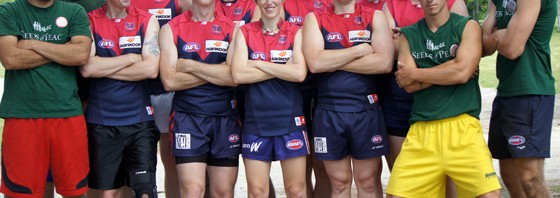

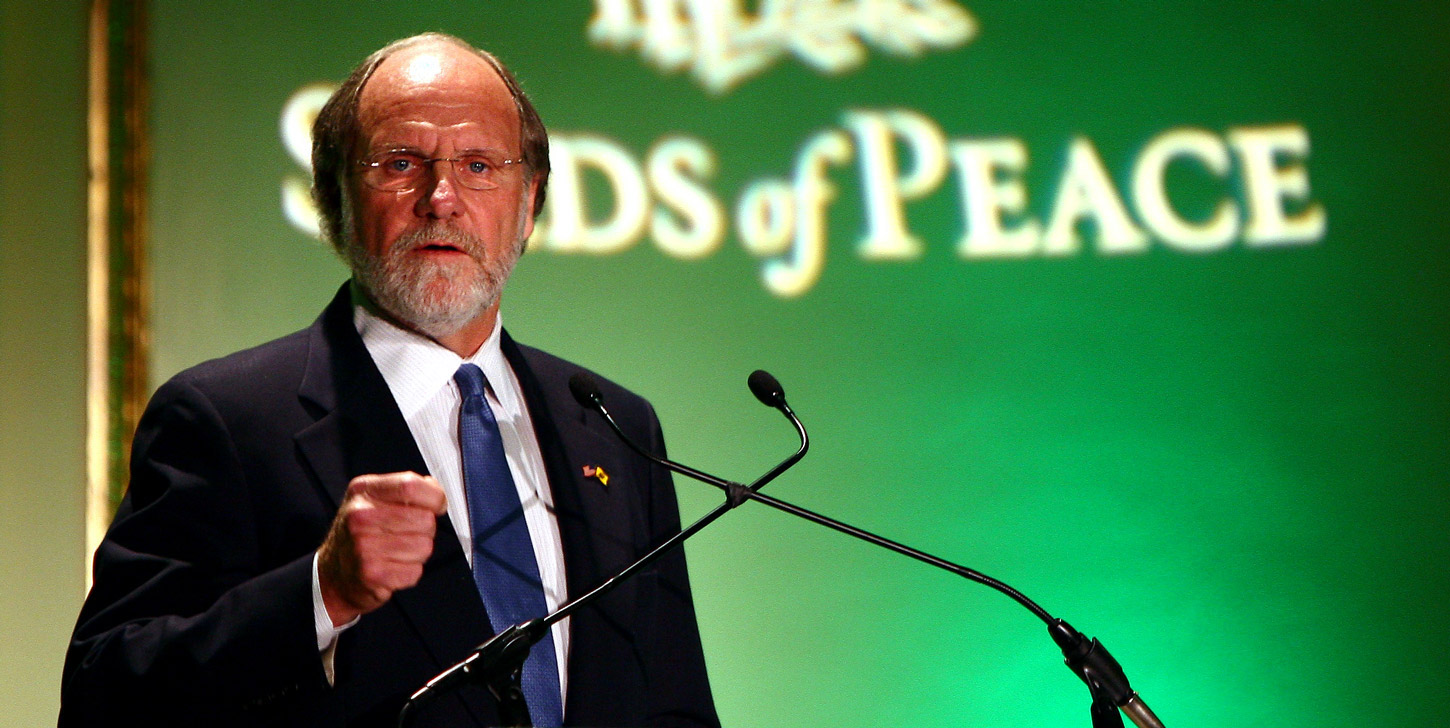
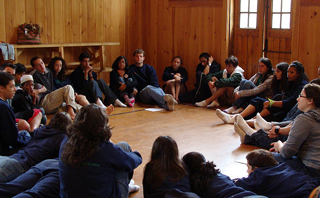 As they entered the front gate, the Seeds of Peace flag was raised to signal the beginning of their intense three-week long leadership training and conflict resolution program. Inside the gate, a new common identity was born among diverse national and religious backgrounds. When they departed on July 13th, they left as friends, empowered to lead their communities in the Middle East and South Asia toward the possibility of peaceful coexistence.
As they entered the front gate, the Seeds of Peace flag was raised to signal the beginning of their intense three-week long leadership training and conflict resolution program. Inside the gate, a new common identity was born among diverse national and religious backgrounds. When they departed on July 13th, they left as friends, empowered to lead their communities in the Middle East and South Asia toward the possibility of peaceful coexistence.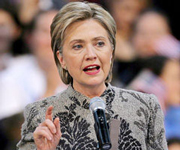 In a major speech delivered in New Delhi, Secretary of State Hillary Clinton said: “I know that there are Indian and Pakistani members of Seeds of Peace in the audience today, who are working to transcend historic divides and begin to plant the seeds, however small, of understanding.”
In a major speech delivered in New Delhi, Secretary of State Hillary Clinton said: “I know that there are Indian and Pakistani members of Seeds of Peace in the audience today, who are working to transcend historic divides and begin to plant the seeds, however small, of understanding.”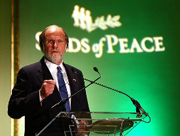 ExxonMobil also accepted the 2009 Corporate Peacemaker Award for their dedication to peace through women’s economic empowerment. All proceeds from the evening went directly to support scholarships for young people from the Middle East and South Asia to attend the Camp in Maine.
ExxonMobil also accepted the 2009 Corporate Peacemaker Award for their dedication to peace through women’s economic empowerment. All proceeds from the evening went directly to support scholarships for young people from the Middle East and South Asia to attend the Camp in Maine.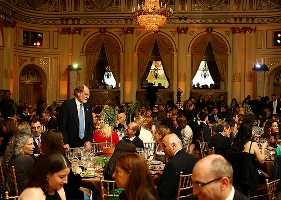 Former President Bill Clinton served as Honorary Chairman of the Benefit Dinner and opened the evening with a video message about his reasons for supporting Seeds of Peace. “I have supported this organization since 1993 when John Wallach brought 46 young Israeli, Palestinian, and Egyptian Seeds to the White House to join me for the signing of the Peace Accords,” said President Clinton. He continued, “Programs on the ground in the Middle East and South Asia continue to support these young people in their development as leaders. Now more than ever, I ask that you support them.”
Former President Bill Clinton served as Honorary Chairman of the Benefit Dinner and opened the evening with a video message about his reasons for supporting Seeds of Peace. “I have supported this organization since 1993 when John Wallach brought 46 young Israeli, Palestinian, and Egyptian Seeds to the White House to join me for the signing of the Peace Accords,” said President Clinton. He continued, “Programs on the ground in the Middle East and South Asia continue to support these young people in their development as leaders. Now more than ever, I ask that you support them.”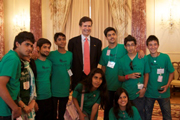 Seeds visited D.C from July 14th-16th and completed visits at the State Department and the Afghan, Indian and Pakistani Embassies.
Seeds visited D.C from July 14th-16th and completed visits at the State Department and the Afghan, Indian and Pakistani Embassies. In recognition of the impact of Seeds of Peace’s unique leadership training and conflict resolution programs and in honor of the nearly 4,000 young ‘Seeds’ working to create more peaceful communities around the world, Seeds of Peace rang the opening bell of the NASDAQ Stock Market on May 26th.
In recognition of the impact of Seeds of Peace’s unique leadership training and conflict resolution programs and in honor of the nearly 4,000 young ‘Seeds’ working to create more peaceful communities around the world, Seeds of Peace rang the opening bell of the NASDAQ Stock Market on May 26th.
